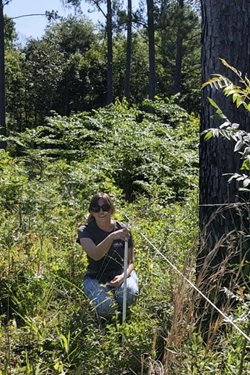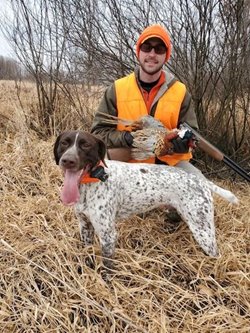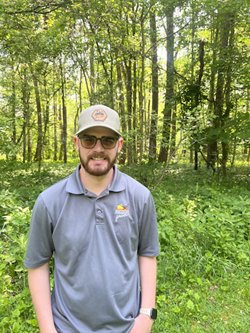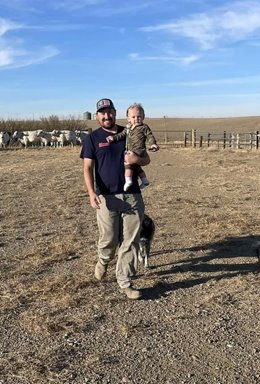A look at the future of the farm bill biologist program
The Farm Bill biologist program is coming up on a milestone.
As we continue to celebrate the program’s 20th anniversary, the number of acres impacted by Farm Bill biologist’s across the country is about to surpass 15 million. Pheasants Forever and Quail Forever’s team of 268 FBB’s are adding to that number every day, addressing habitat needs from the bobwhite pine savannas of the Coastal Plains to the sage steppe of the American West.
While those 15 million acres are thanks in large part to the long-tenured employees who pioneered the FBB program, some amazing work is also being done across the country by the next generation, who will continue to drive the program in the years and decades to come.
“For 20 years our team of Farm Bill Biologists have been leading the way for conservation from South Dakota to Alabama to Oregon,” said Rachel Bush, Pheasants Forever and Quail Forever’s private lands conservation programs manager. “And we have no intentions of slowing down, we’re working hard to develop the next generation of natural resources leaders.”
Let’s look ahead at the future of the Fam Bill biologist program by highlighting some of the best new minds in the field.
Nicole Itzkowitz - Florida

Nicole Itzkowitz was the first FBB ever hired in the state of Florida. She graduated from University of Connecticut in 2019 with a degree in animal science, wildlife conservation, and ecology & evolutionary biology. Itzkowitz has a long-standing passion for the bobwhite quail and worked for the conservation organization Tall Timbers as a game bird research technician before joining Quail Forever.
Through that position she became well acquainted with the bobwhite within the context of the Pine Flatwoods ecosystem, in addition to seeing firsthand how vital prescribed fire is as a management tool. This is factoring heavily into Itzkowitz’s work this spring, as she’s collaborating with local landowners who have NRCS contracts to implement prescribed burns or forest thinning, then measuring the effect on quail populations.
Itzkowitz has been a great resource for the QF team in Florida, which has already grown since she was hired in the summer of 2022. The state recently hired their second FBB, who will cover the state’s western reaches.
“It was a little bit scary to know I was the first biologist in Florida,” she said. “But it’s so cool that I have the opportunity to help the organization expand in a new area.”
Travis Wilder - Wisconsin

Travis Wilder started with the Wisconsin Pheasants Forever team in November 2021. A longtime resident of Wisconsin, Wilder spent six years with the Wisconsin Department of Natural Resources before joining Pheasants Forever.
In his time with the Habitat Organization, Wilder has helped spearhead numerous partnership projects. Most recently he’s been the catalyst behind a project focused on the state’s Glacial Habitat Restoration Area, which encompasses 32 townships in four different Wisconsin counties. The program’s goal is to improve habitat for pheasants, waterfowl and non-game songbirds through prairie and wetland improvement. As part of his work, Wilder is hosting events in that area to raise awareness about this program and let landowners know what’s available to them.
He’s also hosting prairie planting demonstrations this summer as well as some prairie tour visits on DNR properties.
“My three-year-old’s daycare is close to prairie habitat, and every day he comes home and tells me how many pheasants he “got.” — That’s what makes me want to do this job,” Wilder said. “It’s about passing it down to the next generation. In order have species to hunt or admire, we need the habitat.”
Will Hinshaw - Indiana

Will Hinshaw grew up the son of a conservation officer in Monticello, Indiana. Hinshaw contracted his dad’s passion for wildlife at an early age. He attended Purdue University, where he knew he wanted to be a biologist and work with animals but wasn’t sure exactly what that should look like.
“Then one of my professors told me if I want to have the biggest impact on wildlife, you have to manage their habitat,” he said. “I knew from then on I wanted to do habitat work.”
Hinshaw graduated in 2021 and immediately went to work for Pheasants Forever. This spring he’s swamped with landowner requests to help implement quality projects —from pollinator mixes to native warm season grasses and everything in between.
“This habitat is so important to me, especially in Indiana where I grew up,” Hinshaw said. “Upland habitat is maybe not as well known here as in other parts of the country, so anything I can do to improve that land is really meaningful, whether that’s helping bolster pheasant populations or trying to help bring quail back to areas where they used to thrive.”
Maverick Cady

Maverick Cady comes to Pheasants Forever from a unique background. A fifth generation Montana homesteader and rancher, his experience in the ag world allows him a unique perspective when meeting with local landowners.
“I think having that agriculture background helps a whole lot,” Cady said. “Where a producer can walk into the office, and we can have a casual conversation and understand what they’re wildlife goals might be.”
Like Hinshaw in Indiana, Cady is especially tied to his work, having been born and raised in the same communities he’s now helping. He remembers more habitat being on the ground when he was a kid, and said that’s partially what motivated him to move from the ag world into conservation. He started with Pheasants Forever in fall 2022 and has been focusing heavily on CRP enrollment this spring.
“Producers, farmers and ranchers are the stewards of the land,” he said. “In order for our general landscape to work well for wildlife, it must have a working lands component. And the Farm Bill biologist program really bridges that gap between how to maintain these working lands while also keeping wildlife in mind — it must work for everybody.”